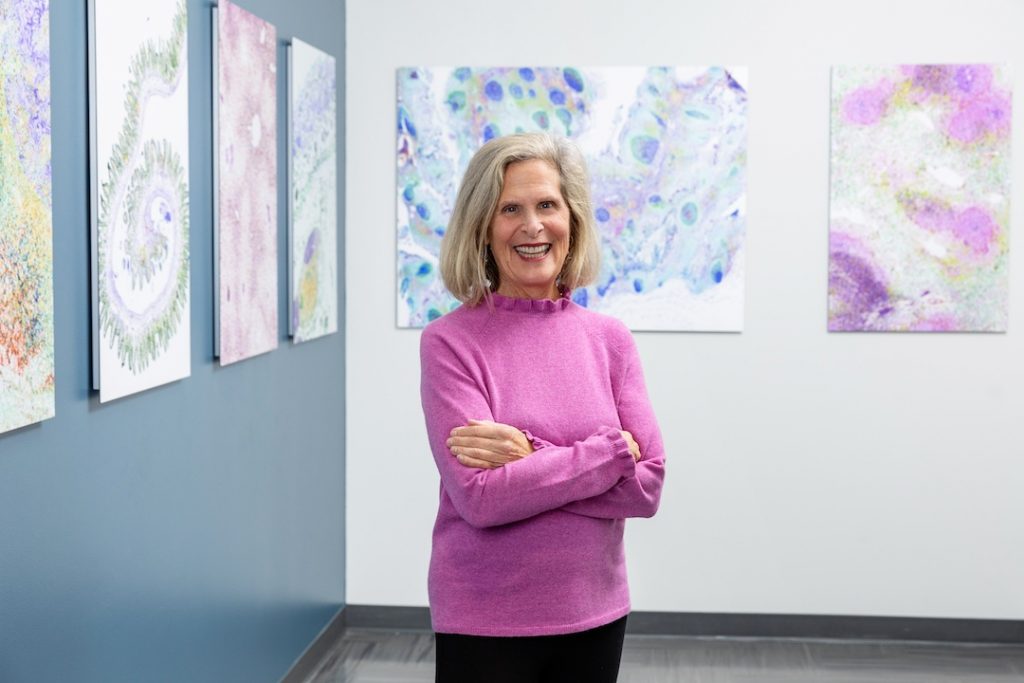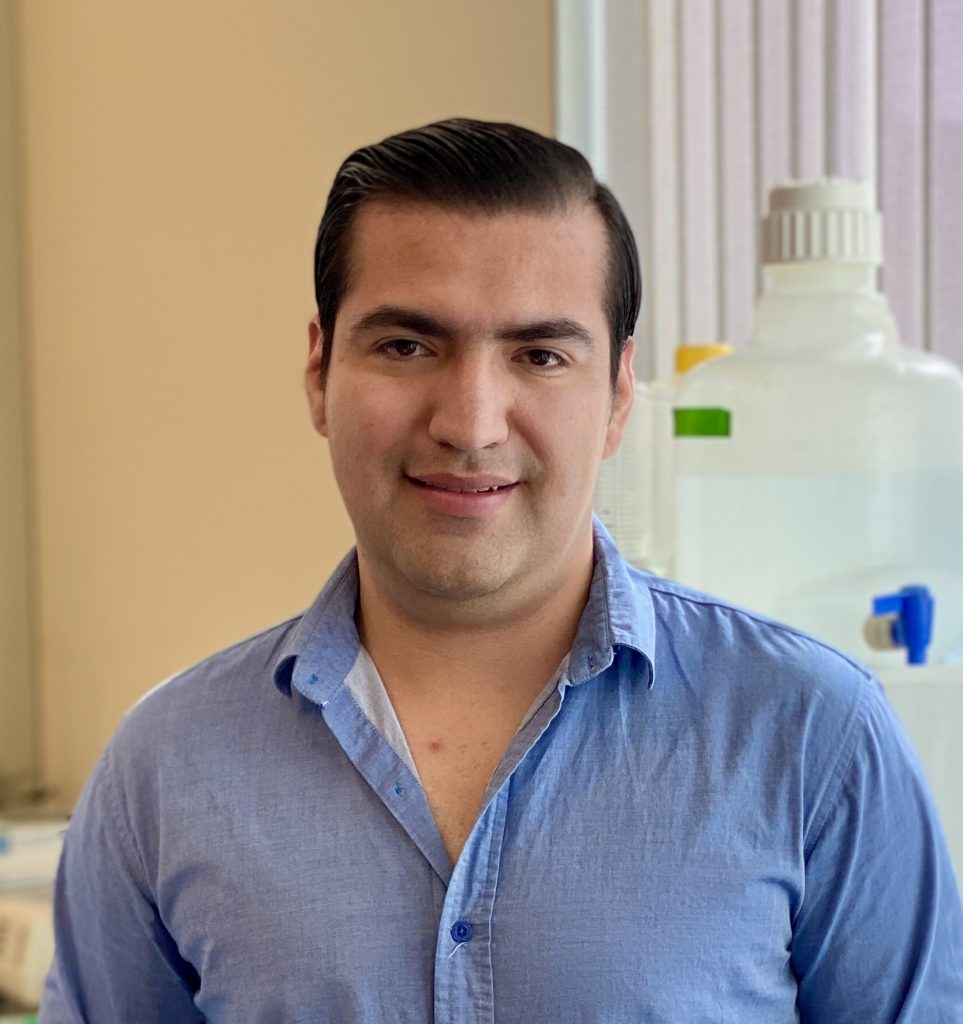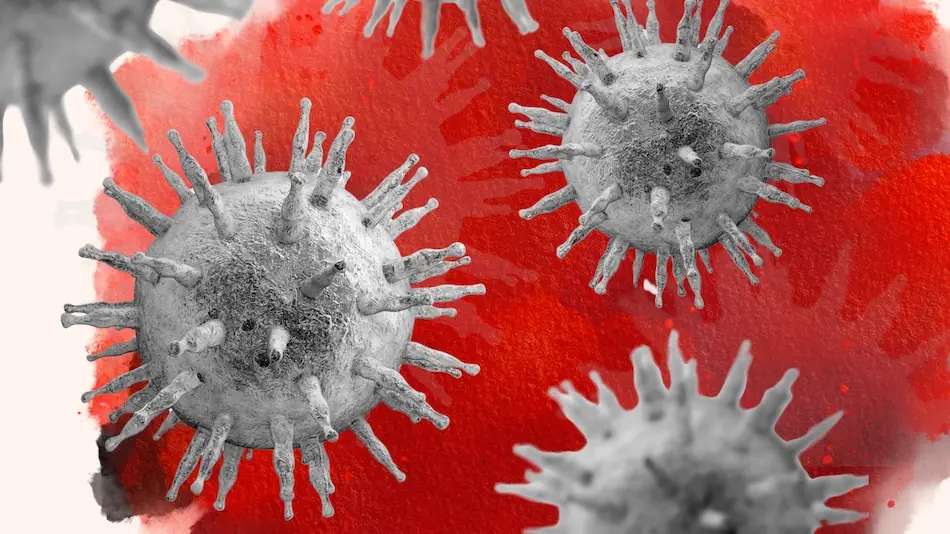Mouse husbandrist, histopathology intern, and part-time mortician. High school student Livia Iacobelli already has an interesting resume. Oh, and she volunteered in a hospital during the height of the COVID-19 pandemic.
Iacobelli is a senior at High Tech High School in San Diego, CA. She’s driven by the goal of working in medicine. To gain experience, she’s made an effort to learn about healthcare, disease, and death from every angle possible. “I’ve been lucky to be part of these key stages of life and death,” says Iacobelli.
Last Spring, Iacobelli interned with the La Jolla Institute for Immunology (LJI) Histopathology Core, which works closely with the LJI Department of Laboratory Animal Care to study immune cells and disease processes in tissue samples. Iacobelli’s mentor was Core Director Kenneth Kim, Dipl. ACVP. “I have some certifications with mice, so I was able to help gender the mice and support Dr. Kim in genotyping them too,” says Iacobelli. “It was very simple stuff for a seasoned scientist, but it was definitely more than a lot of people my age would have the opportunity to do.”
That’s right—as a high school junior, Iacobelli had already earned the certification needed to do basic work with mice in a laboratory setting. Her internship at LJI started simple enough, but her work ethic stood out. Soon she was hard at work on a mouse breeding project. She and several fellow interns were tasked with breeding a mouse model engineered to have fluorescent green platelets and red neutrophils (a type of immune cell) in its blood. This mouse line may prove useful for COVID-19 research as a tool to understand the virus’s effects in the lungs, especially in cases of pulmonary thrombosis (blood clots in the lungs).
Iacobelli’s time at LJI included a chance to visit the medical school at UC San Diego, where she got to see samples of donated human lung tissue. “I was blown away because I really enjoy anatomy, and I worked in a mortuary in the past. So, to me, getting to do that was connecting humans with research,” says Iacobelli.
Yes, about that mortuary work. Iacobelli hadn’t planned to work in a mortuary, though she finds the work fascinating. For as long as she can remember, Iacobelli has loved learning about science. Her interest in medicine and anatomy began when her mother was struck by a devastating autoimmune disease. “Because my mom suffers from Sjogren’s Syndrome, I was exposed to this new part of life not all children are exposed to,” she explains. “I was going to her doctor’s appointments, learning about her conditions, going to the hospital, supporting her post-surgeries and things like that.”
As her mother started doing better, Iacobelli still thought about her experiences in the behind-the-scenes world of medicine. “That led me towards a path of pursuing a healthcare career.”Iacobelli set out—as a high school sophomore—to find an internship in the medical field. Then COVID-19 hit and her hopes were dashed. “No medical offices would take a kid,” Iacobelli says. “Then I realized, you know, what’s better than a medical office? A mortuary. I could still get that hands-on experience while learning about healthcare and kind of bypassing all the COVID restrictions.”
So she found a place at a nearby mortuary and got to work. “I would get off of online learning and run to the mortuary with my dad,” says Iacobelli. “During my intro stage with the mortuary, I got to learn a lot about the different chemicals used for embalming and that process.”
Iacobelli’s parents are immigrants to the United States, so with most of her family far away she hadn’t been to a funeral before. “Since the mortuary is also a funeral home, I was watching services take place and supporting them with the families—and I had my first funeral there,” she says. The mortuary was clearly impressed, and they hired her back the next summer.
“I had a lot more hands-on work because they knew I could handle it,” she says. “They let me watch the embalmings and help them with services. I watched them do makeup and whatever they needed to do to support the families and the individuals that came through the mortuary. It was just an amazing educational experience, especially from a health care perspective—and also as a human experience dealing with death, especially as young as I am.”
By this time in the pandemic, Iacobelli had also found a volunteer position at a UC San Diego hospital. “In the unit I was in, a lot of people came in suffering from COVID and then eventually passed away. I saw the two very clear stages of someone’s life and death,” adds Iacobelli. “With my work at LJI, it was like I had that middle section of being able to support life by studying disease.”
And although she completed her LJI internship, Iacobelli is still part of the research community through a non-profit she started called the Student Healthcare Readiness Program (SHRP). Her mission with SHRP is to help economically disadvantaged students access important tools and mentors in the health sciences. Already, Iacobelli has recruited a team of fellow students to run the program and onboarded over 20 high school students to serve as mentees in their Medical Mentors Program.
This is a personal mission for Iacobelli. She knows her parents met with economic hardship and limited career opportunities when they immigrated to the United States. She knows many students dream of higher education but come up against the burden of cost.
As a high school senior herself, Iacobelli is busy applying and interviewing for top universities. Her first choice would be Stanford, but nothing is certain yet. “I am passionate about going into health care, but I’m still deciding which way I want to go,” she says. “My top two choices would probably be rheumatology or neurosurgery.”





